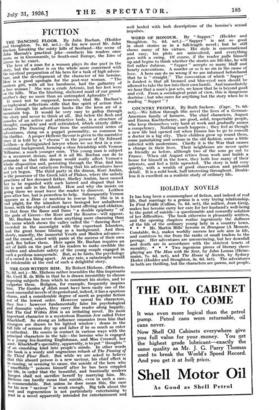FICTION
THE 'DANCING FLOOR. By John Buchan. (Hodder and Stoughton. 7s. 6d. net.)—In his new novel Mr. John Buchan, forsaking the misty hills of Scotland—the scene of John Macnab's practical joke—conducts his readers once more, as in Green mantle, to South-east Europe, the Isles of Greece to be exact. The love of a man for a woman plays, its due pact in the story, but the author is on the whole more concerned with the mystical preparation of his hero for a task of high adven- ture, and the development of the character of his heroine. Here is a good apologia for the post-war woman. " The modern girl, with all her harshness, had the gallantry of a free woman ! She was a crude Artemis, but her feet were on the hills. Was the blushing, sheltered maid of our grand- mother's day no more than an untempted Aphrodite ? It must not be suppoSed, however, that Mr. Buchan's metaphysical reflections stifle that fine spirit of action that- blows through- his adventure books like the keen air of .a mountain top. It would be yery easy to gallop through the story and never to think at all.. But below the flesh and muscles of an active and attractive body, is a structure of thought; complete and well articulated, which utterly entiates The Dancing Floor from the sentimental series of adventures, slung on a puppet personality, so common to the thriller. A proper Hellenic flavour is given to the narrative since it is told by . a " chorus " in the person of Sir Edward Leithen—a distinguished lawyer whom we see first in a con ventional background, forming a close friendship with Vernon Milburne, a much younger man. This young man is subject to a recurrent dream; and it is all Mr. Buchan can do to persuade us that this dream would really affect Vernon's whole disposition and, persisting through the War, find him at the end of that cataclysm feeling that his adventures have not yet begun. The third party in the drama, Kore Arabin, is the possessor of the Greek islet of Plakos, where the unholy practices of her deceased father, Shelley Arabin, have caused her to be regarded with such hatred and disgust that her life is not safe in the Island. How and why she insists on going there we must leave the reader to discover. Leithen goes after her, but is powerless to help. Subsequently Vernon appears as a Deus ex machina to rescue her. She is in a sad plight, for the islanders have besieged her unhallowed house, with the object of making a burnt offering and oblation, so that from the flame and fume " a double epiphany " of the gods of Greece—the Kore and the Kouros— will appear.
Mr. Buchan has never done anything more charming than the scene which shows the valley called the " dancing floor " crowded in the moonlight with the expectant Islanders, and the great house blazing as a background. And then slowly, mazedly, the immortal Youth and Maiden advance— and the crowd, seized with panic at the success of their own spell, flee before them. Here again Mr. Buchan requires an act of faith on the part of his readers to make credible the sudden and absolute safety of the young couple engaged in such a perilous masquerade. But, as he hints, the psychology of a crowd is a thing apart. At any rate, a catastrophe would be intolerable at the end of such a delightful story.


































 Previous page
Previous page